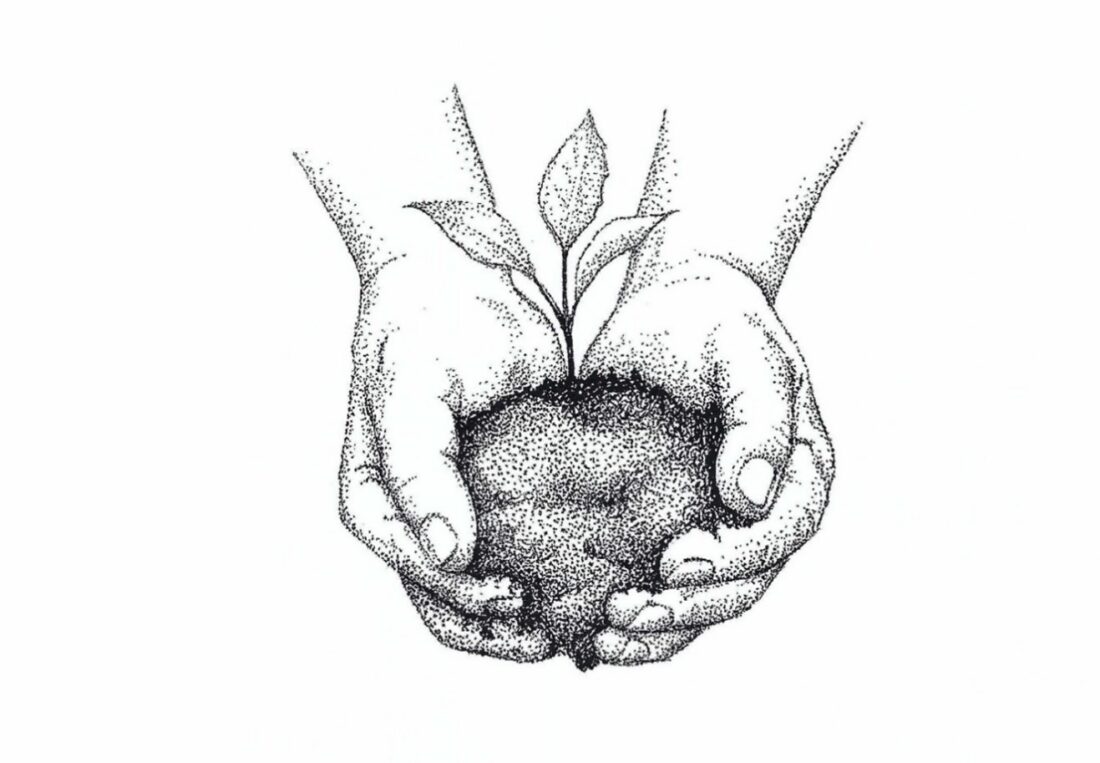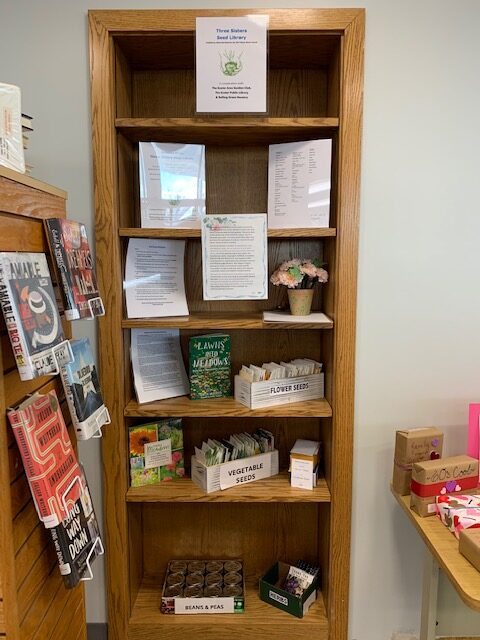Three Sisters Seed Library
Created by Alicia Serratos for her Girl Scout Silver Award

in cooperation with
the Exeter Area Garden Club,
the Exeter Public Library,
& Rolling Green Nursery
Welcome to the Three Sisters Seed Library
The EAGC Three Sisters Seed Library is back the Exeter Public Library. This is our 4th year attempting a seed library and unfortunately we are expecting it to be our last. Unfortunately, over the years we have received very few “returns” at the end of the growing season. One of our goals had been to encourage and educate about the process of seed-saving. We would like to express our gratitude to those of you who did return seeds and support our efforts over the years. We are also grateful to the Exeter Public Library for allowing us to try this experiment, and to Scamman’s Home and Garden and Stout Oak Farm for their generous seed donations. We will be looking to change our seed distribution methods next year, so please keep following us as we grow together!
Seed Library update – Feb. 12, 2022
The Exeter Area Garden Club (EAGC) and the Exeter Library would like to thank everyone who has participated in the Three Sisters Seed Library in 2021. The EAGC received many seed donations at the beginning of the project last year that allowed hundreds of people to come in and “borrow” seeds from the library shelf display. If you borrowed seeds from the library, we hope your gardens were successful, and if you returned seeds, we thank you!
The Three Sisters Seed Library at the Exeter Library needs YOU to help us grow. As our second year is beginning and we are asking all of our borrowers to return seeds that they have saved from the plants they grew last year. If you weren’t able to save seeds, we hope that you might be able to donate some purchased seed packets. Imagine if everyone borrowed a book from the library and none were returned. The library couldn’t exist, and our seed library can’t exist without seeds being returned.
Envelopes for donating saved seeds are available at the Three Sisters Seed Library. Please put saved seeds in the envelopes and fill out the labels. Please donate clean seeds that are no more than 2 years old, please. Seeds must be dry and saved from open-pollinated plants (not hybrid varieties). Purchased seeds that are donated may be left in their original envelopes.
We hope to have a new supply of seeds ready to be borrowed in the spring with your help. The Exeter Area Garden Club thanks you for participating in the Three Sisters Seed Library and for helping us continue to grow!
The Three Sisters Seed Library was created in 2020 by Alicia Serratos. Alicia is a 13-year-old who started learning about gardening and sustainability when she was just 6 years old. She became passionate about seeds and seed saving and, while working on her Girl Scout Silver Award, developed the Three Sisters Seed Box. She has donated a Three Sisters Seed Library to every state in the country. The Exeter Area Garden Club is honored that she chose us to partner with her on this important project.
Alicia says “Since seeds are living things, they must be renewed each year or unique varieties can become extinct. Even growing one seed and returning it to the library is a valuable contribution. Seed libraries are very important to our environment. They help keep seeds safe from pesticides and herbicides and keep big companies from monopolizing and controlling them. Right now, Monsanto and other large corporations own over 60% of the world’s commercial seeds. More importantly, Seed Libraries protect our seed diversity, which means they keep our seed varieties from disappearing. Almost 600 varieties of seed have gone extinct in the last 250 years. Extinction is forever.”
A Seed Library is a depository of seed held in trust for the members of that Seed Library. Members come to the Seed Library to borrow seeds for their gardens. They grow plants in their garden and, at the end of the season, they let a few plants go to seed. From those plants they collect seed and return the same about of seeds (or more) to the Seed Library. Seeds are free to members.
How do you become a member? By signing your name and taking out seeds, you are agreeing to save some seeds at the end of the year and return them to this Seed Library. You will be agreeing to grow your plants, and therefore your seeds, using organic methods: no synthetic fertilizers (like blue Miracle Gro), and using only OMRI rated pesticides for organic gardening only when necessary and following usage directions. Why organic? Organic growing has a lower environmental impact and the consumption of organic foods may reduce your exposure to pesticide residues and antibiotic-resistant bacteria.
Take just a few seeds from the Seed Library to get started, and remember to save some seeds for yourself for planting next year! Put the seeds you are borrowing in an envelope and remember to write the name of the seed and type of seed, along with the date, on the envelope. Take a photo of the packet, if one is available, for additional planting instructions.
If you would like or receive periodic emails from the Exeter Area Garden Club about growing and saving seeds, please add your name to the email list as well. We do not sell or share emails with any other entity.
We are excited to have you as a member of the Three Sisters Seed Library! Happy gardening!
Seed Library Guidelines
Please:
Only take a few seeds to try a variety.
Bring your own envelopes, if possible, & don’t forget to label. Hint: Take a picture of the seed packet.
Only take seeds if you are willing to commit to growing them with organic practices and not treating them with non-organic pesticides.
Place empty seed packets in the “Empty Seed Packet” box.
Know your site. Don’ take seeds that need full sun if you have a shady area. They will not grow.
Feel free to share your own seeds here! Please, nothing more than 3 years old.
Do not share hybrid seeds. The seeds being offered here are only open-pollinated or heirloom seeds. Please do not share hybrid seeds here because the plants will not grow “true.”
Remember this is a Seed Library and you are “borrowing” seeds. Let one or two of your plants go to seed and return seeds at the end of the year (if plants are biennial like kale, then return seeds the following spring.)
If you are unable to return seeds of the variety you borrowed, that’s alright. Sometimes growing does not work out as we plan! In the alternative, please consider donating a seed packet you have purchased.
Do not share plant seeds from invasive species.
Remember to sign out your seeds at the front desk.
Three Sisters Seed Library Donations
Thank you for making a donation to the Three Sisters Seed Library of the Exeter Area Garden Club! Please use best seed saving practices as much as possible. We suggest the following:
• Choose seed from healthy plants – the best plants make the best seed
• Use fully developed seeds only – often for vegetables this is picking later than you would pick for eating
• Clean seeds only – separated from the rest of the plant, free from insects
• Seeds must be dry – mold can occur with damp seeds & drying helps seeds go into hibernation
• Label seeds – with as much information as you can!
• Do not share seeds over 2 years old – seed germination rates lower over time
• Do not share hybrid seeds – offer only open-pollinated (OP) or heirloom (H) seeds
Please feel free to donate extra seeds you have from a purchase. Often times, seed packets have too many seeds to grow for many gardeners, so donating your extra seeds to the Seed Library allows other people to grow them before they are no longer viable.
Please commit to organic practices when growing and do not treat plants or seeds with non-organic pesticides.
Here are some additional things to consider when saving seeds:
Keep your plants labelled, from seed (where they came from) to seed
Consider how the plant was pollinated, does it self-pollinate or does it cross with other similar seeds? For example: carrots seeds can cross with wild carrots or even Queen Anne’s Lace if those plants are within a mile of carrot flowers.
Save seeds from as large a number of plants as practical, not all from the same one
When labeling seed envelopes for donation to the Seed Library please include as much information as possible. This helps tracking of varieties and of the stories attached to each seed line.
Example:
Name: Tomato
Variety: Black Krim
Year: 2019
Grower: Patty Smith
Notes: Plants originally from Bakers Creek, did well in the garden, almost purple in color. Indeterminate. Seed saved from 10+ plants
Questions? Email Patti or Dianne at eagcnhseedlibrary@gmail.com.
Thanks for being part of the Three Sisters Seed Library!
Happy gardening!

Press Release, February 2021:
The Exeter Area Garden Club (EAGCNH) announced the creation of the first Seed Library on the seacoast of New Hampshire. The new Three Sisters Seed Library is now located at the Exeter Public Library and is a program that will allow residents of Exeter and nearby towns to “borrow” seeds from the library. The program hopes to create a community of Seed Library members who grow open-pollinated and heirloom flowers, herbs and vegetables, using organic methods, and save seeds to be returned to the Seed Library to share with others. No library card is necessary to take out seeds, and there is no charge for seeds, but seeds are “checked out” at the front desk.
The Three Sisters Seed Box was created in 2020 by Alicia Serratos from Lake Forest, California, to encourage the development of Seed Libraries. For her Girl Scout Silver Award, she coordinated donation of a Seed Box to every state in the country. The Exeter Area Garden Club is honored to be chosen to partner with her on this important project in New Hampshire. Patti Elwell and Dianne Arnheim of the EAGC are coordinators of the project.
The newly installed Three Sisters Seed Library currently contains over 100 varieties of seeds donated by the Seed Box project from Seed Savers Exchange, Rolling Green Nursery in Greenland, NH, and garden club members. Donations of open-pollinated and heirloom seeds grown with organic practices are also welcome and can be dropped off at the Seed Library in an envelope containing the name of the seed, variety and year collected. Why organic? Organic growing has a lower environmental impact and the consumption of organic foods may reduce exposure to pesticide residues and antibiotic-resistant bacteria.
The goal of the Seed Library is to make the sharing of seeds self-sustaining. The EAGC will also be providing Seed Library members with information on seed growing and saving. Currently, large agricultural corporations own over 60% of the world’s commercial seeds which means that the Seed Library will be helping to protect our seed diversity. Almost 600 varieties of seed have gone extinct in the last 250 years.
